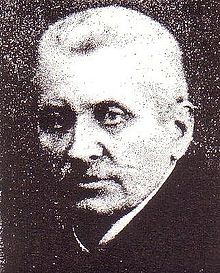Paul Hensel (politician)
Paul Hensel (born October 3, 1867 in Gehsen , Johannisburg district , East Prussia ; † January 8, 1944 in Kolberg , Pomerania ) was a German pastor. He gained historical importance after the First World War as a champion for Masuria to remain in East Prussia.
Life
Hensel attended the Kgl. Lyck High School . After graduating from high school, he began to study Protestant theology at the Albertus University in Königsberg in the summer semester of 1886 . Like many high school graduates from his school, he joined the Corps Masovia . After completing his studies in Berlin, he was pastor in the Masurian parishes Friedrichshof (1891 to 1893) and Gehsen (1893 to 1907). He took care of the evangelical community in Sanremo for half a year . In his native Johannisburg ( Pisz in Polish ) he was superintendent at the Church of St. John the Baptist from 1916 to 1929 . Since 1891 he was involved in the cooperative system . From 1920 to 1924 he was a member of the supervisory board of the Agricultural Central Loan Fund in Berlin .
MP
For the Conservative Party (Prussia) he sat in the Prussian House of Representatives from 1913 to 1918 . Proposed by the DNVP for the constituency of Allenstein 3 (Oletzko-Lyck-Johannisburg), he sat in the Reichstag from March 1921 to May 1928 (Weimar Republic) . He served on the Education, Legal, and Officials Committees.
Trustee of Mazury
Hensel was the first to campaign for Masuria to remain with East Prussia and thus with the German Empire after the First World War. As Johannisburger superintendent, he traveled to the Allied Supreme War Council in Paris in March 1919 with 144,447 signatures to protest against any form of cession of Masuria. On March 22, 1919, Hensel called for the establishment of the Masurian Federation. Three days later, the Allenstein Working Committee against the Polish Danger was set up in Allenstein . On July 14, 1919, the Masurian and Warmian Federation emerged from both associations under the leadership of Max Worgitzki . At the same time, the East German Homeland Service was founded with four largely independent offices in Königsberg, Tilsit, Allenstein and Marienwerder. Besides Max Worgitzki and Paul Hensel, it was above all Paul Marks and Kurt Thiel in Allenstein and Richard Götz in Marienburg who prepared the vote. When the Masurians and West Prussians were to vote in the Allenstein voting area in 1920 on whether they wanted to belong to Poland or East Prussia, Hensel headed the committee of the Protestant parishes in Masuria. He resolutely opposed the annexation to Poland. For the 100th foundation festival of his corps he wrote the song "Weiht in frohem Festesjubel / new Masovia your song" , which was sung to the melody of the Germany song.
See also
- List of members of the Reichstag of the Weimar Republic (1st electoral term)
- List of members of the Reichstag of the Weimar Republic (2nd electoral term)
- List of members of the Reichstag of the Weimar Republic (3rd electoral term)
- List of corps students in the Prussian House of Representatives
- List of corporation members of the Reichstag (Weimar Republic) # Kösener
Honors
Incomplete list
Fonts
- The Protestant Masurians in their ecclesiastical and national characteristics. A contribution to church history on the question of Catholic-Polish propaganda in Masuria. Königsberg 1908 (Writings of the Synodal Commission for Eastern European Church History, No. 4).
- The Polish danger for the Masurian population. Berlin 1911.
Web links
- Paul Hensel in the database of members of the Reichstag
Individual evidence
- ↑ Kösener Corpslisten 1930, 89/810
- ↑ a b Friedwald Moeller, Old Prussian Protestant Pastor's Book from the Reformation to the Expulsion in 1945 , Hamburg, 1968, pp. 39–40, 59
- ^ List of all members of the Corps Masovia 1823-2005 . Potsdam 2006
- ↑ Loan Association (zeno.org)
- ↑ Bernhard Mann (edit.): Biographical manual for the Prussian House of Representatives. 1867-1918. Collaboration with Martin Doerry , Cornelia Rauh and Thomas Kühne . Düsseldorf: Droste Verlag, 1988, p. 175 (handbooks on the history of parliamentarism and political parties: vol. 3); for the election results see Thomas Kühne: Handbook of elections to the Prussian House of Representatives 1867–1918. Election results, election alliances and election candidates (= handbooks on the history of parliamentarism and political parties. Volume 6). Droste, Düsseldorf 1994, ISBN 3-7700-5182-3 , pp. 122-124.
- ^ Andreas Kossert : East Prussia. History and myth . Munich 2005, p. 219
- ↑ Reichstag Handbook, III. 1924 parliamentary term
- ^ Information about the Evangelical Central Archive in Berlin
| personal data | |
|---|---|
| SURNAME | Hensel, Paul |
| ALTERNATIVE NAMES | Hensel, Paul Viktor Karl (full name) |
| BRIEF DESCRIPTION | German theologian, politician (DNVP), MdR |
| DATE OF BIRTH | October 3, 1867 |
| PLACE OF BIRTH | Gehsen , Johannisburg district, East Prussia |
| DATE OF DEATH | January 8, 1944 |
| Place of death | Kolberg , Pomerania |

